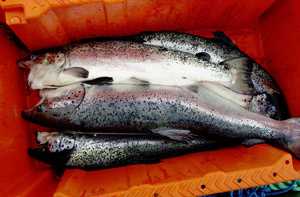|
A serious salmon disease that affected over half Scotland's fish farms last year could be spreading at twice the rate this year.
According to anti-salmon farming campaigner Don Staniford, the Scottish Executive issued orders for 325 cases of Infectious Pancreatic Necrosis (IPN) last year, when cases were up from 180 in 1998.
He claims that the Executive's figures, plus information contained in the Edinburgh Gazette, show that in 2002 farms are being infected at nearly three times the rate that they are being cleared of disease.
Shetland has accounted for over a third (37 per cent) of new disease orders over the last year. While the Western Isles (20 per cent), Orkney (five per cent) and Skye (three per cent) are all showing increases.
However, Shetland Salmon Farmers Association chief executive David Sandison said that, although IPN may be the single biggest concern for Shetland salmon farmers, the industry could live with it.
In Shetland, IPN wiped out 10 per cent of last yearıs smolt intake - 1.4 million fish. Some farms have lost as much as 80 per cent of smolts and it's been predicted the cost to Shetland's economy could be more than GBP 2 million.
SSFA takes the illness so seriously that it is sponsoring research into IPN, along with Aberdeen University.
A seminar will also be held next month at the North Atlantic Fisheries College, to help develop good husbandry protocols for dealing with any outbreak of IPN and minimising its impact.
According to Mr Staniford, wild fish could also be at risk from escapes of infected farmed salmon.
He said: "The increasing incidence of escapes - some one-million in the last five years - in IPN-infected areas, especially in Shetland and Orkney, raises serious concerns surrounding the transfer of IPN to wild fish.
"IPN-infected escapees have already been caught in the Lochaber area and it is estimated that thousands if not hundreds of thousands of infected farmed fish have escaped from their cages over the last five years."
Despite its prevalence, plenty of mystery still surrounds many aspects of IPN.
It is thought to be a disease of fry and other freshwater stages of salmon, vertically transmittable (from parent to offspring).
However improved hygiene (disinfection of ova), certification of broodstock by FRS and controls on fish movements have vastly reduced the incidence of disease in fresh water. Since the late 1980s, IPN has emerged as a problem in post-smolts in seawater. Mortalities can be very high, as much as 30 per cent in some cases.
It is still not known whether the disease is introduced to high-occurrence areas like Shetland from elsewhere, or whether it is endemic.
By Peter Johnson
FIS Europe
|
